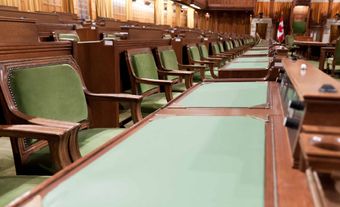Hansard
Hansard is the unofficial name of the record of parliamentary and legislative debates. The name comes from the Hansard family, which printed the British debates from 1812 to 1892. It provides a statement in both official languages of spoken proceedings in both Houses of Parliament, partly for the immediate convenience of legislators but also as an indispensable historical archive. In its present form Hansard dates from 1880, when an official debates reporting branch, which now has its own director, was added to the parliamentary staff. Before that, from 1875 to 1879, a record was provided, though not by regular staff. Before 1875 somewhat haphazard collections were preserved, some of them known as Scrapbook Hansards, based on contemporary newspaper reports which covered Parliament in detail. Several of the colonies kept Hansards irregularly before Confederation, the earliest being Nova Scotia in the 1820s.
The modern Hansard is an efficient enterprise which, during the session, produces a copy of each previous parliamentary day's debates within hours. At one time the printed copies came from shorthand reports taken on the floor of the House by reporters working 10-minute shifts, each reporter then dictating the notes to a second person. Today the debates of the House of Commons are digitally recorded. Transeditors then listen to the digitized audio files and transedit the proceedings into computer terminals from which transcripts of the debates are produced. The HOUSE OF COMMONS also has a Broadcast Branch which keeps a complete audio and video record. Hansard serves as a vital working tool and reference source for many people. Accordingly, its accuracy and short production time are critical to its success. It is now available through Parliament's computer network (on PubNet), and on the Internet. Hansard is published by the Canada Communication Group and, in addition to the daily editions, is issued regularly in bound, well-indexed volumes readily available in libraries.

 Share on Facebook
Share on Facebook Share on X
Share on X Share by Email
Share by Email Share on Google Classroom
Share on Google Classroom


.jpg)